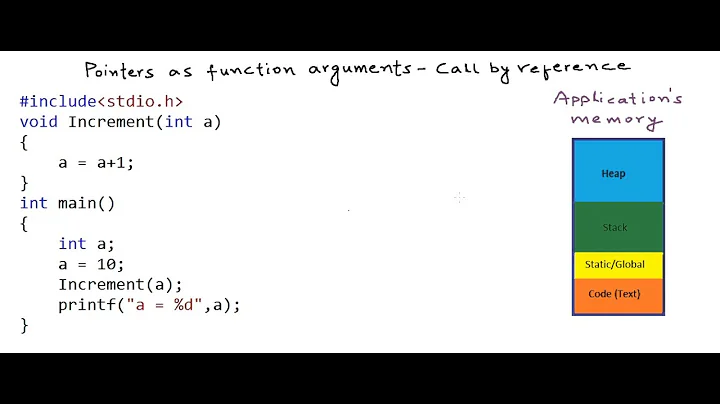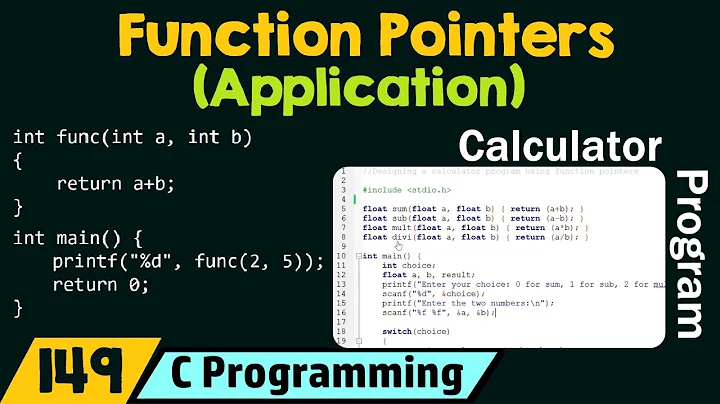Passing a pointer to an assembly function
At least one of the operands to cmp has to be a register. If you're trying to compare the contents of two memory locations, you'll need to put one of them in a register. How to get it into a register you ask? Well you've done just that already with your example code. This line:
movl 8(%esp), %ecx
Takes the 4 bytes at %esp+8 and puts them into %ecx. In a C-like psuedocode:
ecx = *(esp + 8);
Hopefully that makes sense. You can do similar operations to get your pointers off of the stack and into registers, and then dereference them, compare the dereferenced values, and so on. Let me know if you have more questions!
Edit - your broken out questions:
how to pass a pointer in and keep it as a pointer?
You're already doing that, and your
movl 8(%esp), %ecxinstruction, or something like it will do everything you need.how to use the value of said pointer in assembly? (e.g., like *ptr in C)
You need to use the
()again - to load the first byte out of the pointer in%ecxfrom your instruction above, for example:movb (%ecx), %edxIn the C-like pseudocode similar to how I used it above, this instruction is:
edx = *(unsigned char *)ecx;Do I want to look at the LEA operand?
Probably not, based on the description of your problem you've provided. It is always possible, though.
leaworks something like like the&operator in C. As an example, this instruction:lea 12(%ecx), %edxcan be translated into our pseudocode as:
edx = &(*(ecx + 12))or more simply:
edx = ecx + 12This example is a bit silly, since we're using a relatively uncomplicated addressing mode, but how about something like this:
lea 1(%edx,%ecx,4), %eaxwhich means:
eax = &(edx[ecx * 4] + 1)
Often the easiest solution to these sorts of problems is to write your routine in C, then compile it and disassemble the results.
Edit 2:
Your example program seems almost right, but you're trying to dereference pointers in memory - get those pointers into registers first and you should be ok.
Related videos on Youtube
raindog308
Updated on June 04, 2022Comments
-
raindog308 almost 2 years
I'm rather new to assembly programming. I'm using the x86 platform with GCC (Linux).
I have a function that I want to call from C as:
myfunc ( unsigned char * s1, unsigned char * s2, int someint );The function will take the s1 and s2 memory locations and compare them, then increment and compare, etc., doing some processing as it goes. This is sort of like memcmp but I'm doing more.
My question: if I pass a pointer into an assembly function? And then how do I say "give me the value stored at this memory address"?
Here's what I have so far:
To get the first function arg ("s1") off the stack, I do this (someaddress is a 32-bit integer, and I'm working on a 32-bit processor):
movl 8(%esp), %ecx movl %ecx, someaddressIf I put
somevarinto%eax(or%ebx, etc.) and then printf it with%p, I see that its address and the address of the unsigned char pointer "s1" I passed it are the same. But I suspect that what I've actually done is taken the memory address, converted it to an integer, and then put that integer in someaddress.For example, if I then do this:
movl pos1, %eax movl pos2, %ebx cmp (%eax),(%ebx)I get "Error: too many memory references for `cmp'". I'm not entirely certain what that means, except "you screwed up" ;-)
So...
- how to pass a pointer in and keep it as a pointer?
- how to use the value of said pointer in assembly? (e.g., like
*ptrin C)
Do I want to look at the LEA operand?
I'm using Richard Blum's "Professional Assembly Programming" as my guide, but Blum doesn't seem to cover this case.
Update
Thank you very much for your learned response!
Unfortunately, I'm still not able to dereference.
Here is a simplified example. The assembly function takes a pointer and should echo it back. Instead I get:
first_ptr points to 81 (should be 81) <-- from C program the value is -1543299247 <-- printf called from within assembler the value is -6028513 <-- printf called from within assembler my function returned -6028513 <-- return value printed from C programC Program:
#include <stdio.h> #include <string.h> int main (void) { unsigned char first; unsigned char * first_ptr; first = 'Q'; first_ptr = &first; printf ("first_ptr points to %i (should be 81)\n",*first_ptr); printf ("my function returned %i\n", myfunc(first_ptr)); return 0; }Assembly program:
.section .data msg: .asciz "the value is %i\n" .section .bss .lcomm str, 8 .section .text .type myfunc, @function .globl myfunc myfunc: # save stack pushl %ebp movl %esp, %ebp # save string arg from stack to "str" movl 8(%esp), %ecx movl %ecx, str # let's try printing the ecx dereference pushl (%ecx) pushl $msg call printf # put the value of str on the stack # and call printf pushl (str) pushl $msg call printf # now return the character at pos1 movl (str), %eax # restore the stack movl %ebp, %esp popl %ebp ret






